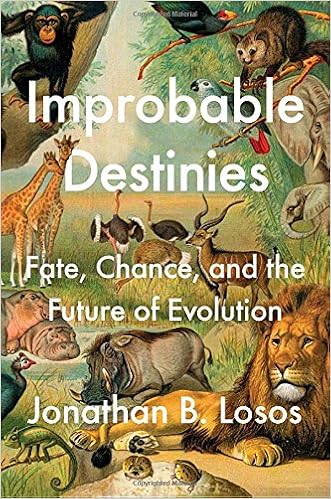 An excerpt at ScienceFriday from Improbable Destinies: Fate, Chance, and the Future of Evolution by zoologist Jonathan B. Losos:
An excerpt at ScienceFriday from Improbable Destinies: Fate, Chance, and the Future of Evolution by zoologist Jonathan B. Losos:
Ironically, it was research on the birds bearing Darwin’s name—the Galápagos finches—that drove the dagger through the heart of the idea that evolution is always slow. Like the peppered moth, Darwin’s finches have become one of the poster-child examples of evolution, and not just because of their name and history. Rather, much of their fame stems from the extraordinary forty-year research program of Princeton biologists Rosemary and Peter Grant.
Starting in 1973, the Grants spent several months each year on the small, crater-shaped Galápageian island of Daphne Major. Their goal was to study the population of the medium ground finch (so named because there are both larger and smaller ground finch species) to see whether and how the population changed from one generation to the next and to attempt to measure natural selection driving such change.More.
Yes, but the changes, while swift, were not very important or difficult and have also been accounted for by hybridization.
From the publisher:
A major new book overturning our assumptions about how evolution works
Earth’s natural history is full of fascinating instances of convergence: phenomena like eyes and wings and tree-climbing lizards that have evolved independently, multiple times. But evolutionary biologists also point out many examples of contingency, cases where the tiniest change—a random mutation or an ancient butterfly sneeze—caused evolution to take a completely different course. What role does each force really play in the constantly changing natural world? Are the plants and animals that exist today, and we humans ourselves, inevitabilities or evolutionary flukes? And what does that say about life on other planets?
Jonathan Losos reveals what the latest breakthroughs in evolutionary biology can tell us about one of the greatest ongoing debates in science. He takes us around the globe to meet the researchers who are solving the deepest mysteries of life on Earth through their work in experimental evolutionary science. Losos himself is one of the leaders in this exciting new field, and he illustrates how experiments with guppies, fruit flies, bacteria, foxes, and field mice, along with his own work with anole lizards on Caribbean islands, are rewinding the tape of life to reveal just how rapid and predictable evolution can be.
Improbable Destinies will change the way we think and talk about evolution. Losos’s insights into natural selection and evolutionary change have far-reaching applications for protecting ecosystems, securing our food supply, and fighting off harmful viruses and bacteria. This compelling narrative offers a new understanding of ourselves and our role in the natural world and the cosmos.
Maybe, but he will need to do better than Darwin’s finches, the chosen excerpt. The biggest selling point is probably just the bird’s name.
See also: Brittle stars from 275 mya preserve old forms